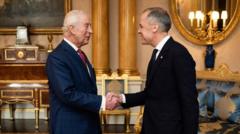In retrospect, Canada's relationship with the British monarchy has undergone a significant transformation over the years. A decade ago, Prime Minister Stephen Harper's emphasis on royal ties sparked controversy, showcasing Canada’s continued struggle for independence. However, the trajectory seems to have reversed under Carney’s leadership, which aligns with the Liberal agenda of affirming Canada's distinct identity separate from American influence.
Canadian royal historian Justin Vovk emphasized that the invitation reflects a larger affirmation of Canada's unique traditions and a response to Trump's repeated insinuations that Canada is merely the "51st state." Notably, Canada’s political identity has evolved since its colonial past, particularly after it fully repatriated its constitution in 1982, thus gaining legislative autonomy.
Although Canada's ties to the Crown have weakened in public sentiment—especially among younger generations—Carney's invitation hints at a strengthening of these connections as a strategic diplomatic tool. Amid economic pressures and tariffs imposed by Trump, Carney's government aims to showcase sovereignty while simultaneously appealing to those who admire the British monarchy, including Trump himself.
Furthermore, the upcoming royal visit is not just a nod to tradition but also an opportunity to send a political message of unity and legitimacy amid a changing global landscape. With the monarchy representing a constant through shifting political tides, Carney hopes to strengthen ties with Europe while reaffirming Canada's sovereignty on the world stage.
As the royal couple prepares to visit Canada, their brief yet significant time together will undoubtedly resonate with both historical and contemporary implications for the nation, setting a stage for potential discussions around reconciliation and the future of the monarchy in Canadian society.
Overall, the King's visit is poised to be ceremonially impactful, serving both as a reminder of the monarchy's enduring legacy and a political gesture against external pressures, primarily from the U.S. under Trump's influence.
Canadian royal historian Justin Vovk emphasized that the invitation reflects a larger affirmation of Canada's unique traditions and a response to Trump's repeated insinuations that Canada is merely the "51st state." Notably, Canada’s political identity has evolved since its colonial past, particularly after it fully repatriated its constitution in 1982, thus gaining legislative autonomy.
Although Canada's ties to the Crown have weakened in public sentiment—especially among younger generations—Carney's invitation hints at a strengthening of these connections as a strategic diplomatic tool. Amid economic pressures and tariffs imposed by Trump, Carney's government aims to showcase sovereignty while simultaneously appealing to those who admire the British monarchy, including Trump himself.
Furthermore, the upcoming royal visit is not just a nod to tradition but also an opportunity to send a political message of unity and legitimacy amid a changing global landscape. With the monarchy representing a constant through shifting political tides, Carney hopes to strengthen ties with Europe while reaffirming Canada's sovereignty on the world stage.
As the royal couple prepares to visit Canada, their brief yet significant time together will undoubtedly resonate with both historical and contemporary implications for the nation, setting a stage for potential discussions around reconciliation and the future of the monarchy in Canadian society.
Overall, the King's visit is poised to be ceremonially impactful, serving both as a reminder of the monarchy's enduring legacy and a political gesture against external pressures, primarily from the U.S. under Trump's influence.



















